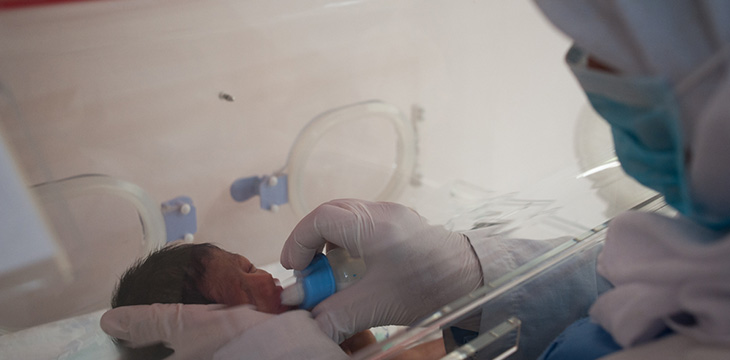No peace for Syria
Maria, Medical Advisor for Un Ponte Per…, has been working in the Al Hol camp since last winter. Here, 64,000 people arrived in just 4 months, fleeing the final battles with Daesh. We are working together to face this new humanitarian emergency.

“So many people arrived since December 2018. Every day. They were mostly women with their children, arriving here in a terrible state – malnourished and skeletal – after days of walking. They described the horrors of the fighting and their flight. Many people died during the journey, when there was not enough food and they had to live in underground tunnels for weeks”.
Maria, a Medical Advisor for Un Ponte Per…, has been working in the Al Hol camp since last winter. Here, in this forgotten place on the Iraqi border, 64,000 people arrived in just 4 months, fleeing the final battles with Daesh (Islamic State). 60,000 of these people were women and children.
“Al Hol was originally established in 2016 to shelter 5,000 refugees and IDPs. That number grew from 9,000 to 80,000 in a very short period,” Maria explains. “Our social workers saw it grow day by day, one section at a time”.
Technically speaking, each new section of the camp is called an “annex”: and so, one annex at a time, Al Hol expanded to become Syria’s largest refugee camp, which became notorious for the number of inhabitants who died of hunger and cold. Today it is a huge mass of tents where people line up outside the only 2 Healthcare Centres, which we opened together with our partners since 2015, the Kurdish Red Crescent. But it is the camp’s rapid and uncontrolled growth which has created the crisis situation: “Essential services are just not available, and we are working in extremely challenging circumstances”, Maria explains.
Al Hol is infamous for many reasons, perhaps the most tragic of which is the fact that its “annexes” host Daesh widows: 9,000 people of 60 different nationalities, all wives of “foreign fighters,” for whom no governments will accept responsibility. Abandoned people who cannot even access basic healthcare, because of the anger and rancour of the other camp inhabitants. And it is this situation, lived out between tents and suffering, that shows us the real consequences of this war. Even after the weapons have been silenced, we see only the smallest traces of life before the conflict, so people must now start all over again.
“Before the war, Syrian doctors were famous for being the best in the world, and that is still true today”, says Maria, who recalls that when she first arrived at the camp, her colleagues were dedicated and brave professionals who, despite everything, had chosen to stay in their own country.
“But 8 years of war has limited their access to professional refresher courses: whenever we offer training courses, they are very enthusiastic and full of excellent ideas”.
One such idea was to create Teams of Community Health Workers, to facilitate a Community Healthcare system for these people who have suffered through years of war with a very fragile healthcare infrastructure. The cCmmunity Health Workers are just normal people who before the war worked in different sectors, but who today, after intensive training courses, are able to build trust and provide basic healthcare to members of their own communities.
From early diagnosis to the provision of basic health information and advice, the Community Health Workers are also committed to providing the kind of human interaction which can be hard to find in places like this.
“Often they are women who really want to make a contribution to rebuilding their country”, Maria explains. “In Syria, it is always a woman who opens the door to you; so finding another women on the doorstep facilitates interaction. Community Health Workers can offer advice on pregnancy, breastfeeding and child nutrition: frequently mothers themselves, they inspire trust in the women they work with”.
The objectives of the Community Health Workers are based on a the assumption that in Syria it is always the women who look after the home and put food on the table, even if there isn’t always a table and the food is rice from a humanitarian aid distribution.
“If they can take batter care of themselves, they can also take better care of their families and raise healthy children. This would allow us to shift our focus from treatment to prevention, and render our progress more stable and sustainable”, Maria adds.
We have been active here since 2015 and in that time we have seen how the system has evolved. Doctors and Health Workers now work in situations which previously seemed impossible. They used to transport patients in cars when there were no ambulances. But we have seen them rebuild the remains of their healthcare services, one piece at a time.
And now we are working together: because even after the humanitarian crisis ends, we will still have to rebuild this country devastated by war, starting with the right to health, which must be guaranteed to everybody.
***
It is important to make a contribution now to ensure free treatment for everyone. Donate now >>
L’intervento nel campo di Al Hol è implementato nell’ambito del progetto “Fourniture de soins de santé primaires et de services d’urgence aux réfugiés iraquiens et aux personnes déplacées à l’intérieur du camp d’Al Hol (2019-009)”.
